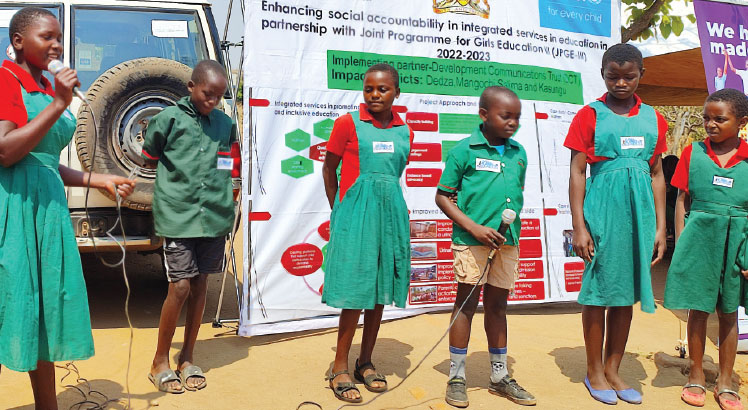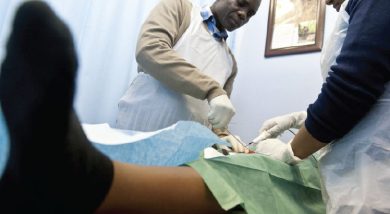Community helps children learn
Sarai Sambo got pregnant at 14 and dropped out in Standard Seven at Chitunda Primary School in Kasungu District.
“It was just peer pressure,” she says. “My friends had sexual relationships, so I nodded to approaches by my classmate who later denied responsibility for the pregnancy.”
Sarai, now 16, has returned to school after delivering a baby boy in 2022.
She thanks Chitunda Mother Group, teachers and schoolmates who persuaded her to re-enrol.
Her re-admission is among the highlights of the United Nations Joint Programme on Girl Education project being implemented in Kasungu, Dedza, Mangochi and Salima by the Development Communications Trust (DCT) with support from Unicef and its sister UN agencies.
However, the girl comes from a poor family that survives on piecework.
From Monday to Friday, her mother had to bring the baby to school to be breastfed during break time.

Despite these challenges, she passed her Primary School Leaving Certificate of Education (PSLCE) exams and got selected to Chamakala Community Day Secondary School (CDSS).
“I am glad that I went back to school. I will work hard to become a nurse and adequately provide for my son and community,” she says.
The firstborn in a family of four has become a pride of her community.
Similarly, Chifundo Phiri, from Kaphaizi in the area, stopped going to school after impregnating a girl.
He has also returned to school in response to community interventions.
Chifundo narrates: “I dropped out because I felt like I was too old to be in Standard Six, but the mother group, classmates and teachers never got tired of visiting me. They convinced my parents to send me back to school.”
Chifundo, 17, is in Form One at the CDSS.
He has become an ambassador of lifelong learning, encouraging fellow learners to work hard in school and dropouts to re-enrol.
DCT executive director Prince Mtelera says the project has empowered children and communities to jointly solve challenges affecting their schools and protect learners who return to school.
“We also train learners in target primary schools to demand social accountability from authorities to improve education,” he explains.
The learners’ council takes part in drawing budgets and implementing development activities at the school.
The learners’ body also engages community leaders to support efforts to improve teaching and learning as well as children’s safety and rights.
The council leaders also discourage bullying to make the readmission policy work.
Meanwhile, community leaders are happy that Sarai and Chifundo are back in school.
“The dropout rates in our schools are declining,” says group village head Machado. “Previously, not many dropouts were returning to school due to bullying by both learners and teachers.”
The traditional leader commended the learners, teachers and concerned mothers for supporting boys and girls to learn until their dreams come true.
Kasungu principal education officer Pious Ng’omang’oma says most learners such as Sarai and Chifundo revert to illegal marriages as most of them come from poor backgrounds.
“Dropout rates are high in Kasungu due to teen pregnancy, poverty and lack of interest in school. We thank partners who are supporting government to make the readmission policy work,” he says.
In the last academic year, the project helped 24 dropouts re-enrol at Chitunda Primary School.
Chitunda mother group chairperson Beatrice Banda said their job is made easier by community by-laws that compel parents to send children to school
“Apart from the by-laws, some chiefs even send gule wamkulu to drive children from homes and markets during school hours,” she says.
Chitunda head teacher Blessings Chigona says the joint efforts have instilled discipline in learners and improved teachers’ performance for the benefit of children.
He says: “Out of 49 learners who sat PSLCE exams this year, 42 have passed and 18 were selected to various secondary schools.
“Previously, less than half could pass.”





